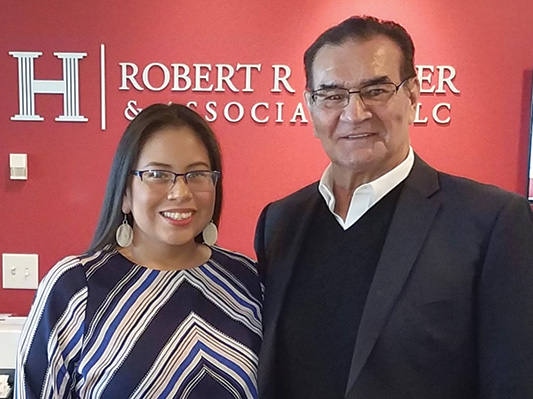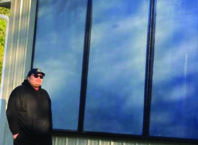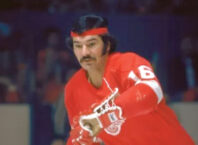By Lee Egerstrom
This time of year people want to talk hockey when they encounter Henry Boucha.
Not now. Hockey – all sports – has hit a complete stop with everyone trying to avoid the coronavirus, or COVID-19.
So, how’s business? “Flat as a pancake,” said Boucha, an Edina Realty agent in the Twin Cities metro area and adjacent areas of western Wisconsin. “Like hockey.”
People aren’t out looking at houses with the health threat all around, he said. This comes even as interest rates for mortgages are at record or near record lows – a sure stimulus for home buying in normal circumstances.
“A few sales are going on, but not much,” he said. But that has crashed. Minnesota joined Wisconsin and other states on March 25 in shutting down all but essential services with “Stay at Home” directives.
Boucha doesn’t like riding the bench – even if at home.
He is a legendary Warroad High School hockey player who would normally have been at hockey tournaments the last few weeks. Or at Minnesota Wild professional hockey games in St. Paul if they were being played.
At all such venues, people would ask him about his Silver Medal from playing on the U.S. Olympic men’s hockey team in 1972. Others would ask about his career playing with the Detroit Red Wings, Minnesota North Stars, Kansas City Scouts and Colorado Rockies, and about his induction to the U.S. Hockey Hall of Fame in 1995. Some, he always hoped, would ask how his work promoting Native American accomplishments was coming along.
Boucha is much more than an international hockey legend. He became a licensed real estate agent in 1987 and in the years since he has emerged as a leader in encouraging Native American pride and public awareness of indigenous people’s contributions to greater society.
“This is my passion,” Boucha said in a recent interview. “After hockey, I found myself in my culture, my traditions, my spirituality. I want young Native Americans to find this strength that we all have been given but don’t always recognize.”
This is a crusade driving Boucha through years of living back home at Warroad, and in Alaska, and more recent years in the Twin Cities metro area.
At Warroad he worked as a youth hockey coach and with Ojibwe and American Indian education programs with Warroad schools.
Now living in White Bear Lake, he continues to serve as an American Indian education consultant for the South Washington County School District. It has three high schools (Woodbury, East Ridge and Park, of Cottage Grove), four middle schools and 17 elementary schools.
“I’m a pipe carrier from the Lake of the Woods region,” he said. That directs him, he added, in trying to get young people to understand the strength in their culture and spirituality to deal with racism and prejudice they may also experience in life.
He continues that work well beyond his home communities.
Boucha serves on the board of directors for the Herb Brooks Foundation, the sports promoting organization that is a legacy of the great hockey coach who led the “Miracle on Ice” U.S. team to the Gold Medal in the 1980 Olympics.
He is also a board member of the National Coalition Against Racism in Sports and Media that is a Minnesota-based national organization, the Juel Fairbanks Chemical Dependency board that runs Juel Fairbanks Recovery Services in St. Paul, started by a prominent Ojibwe; and the Ain Dah Yung Center and its housing programs in St. Paul.
In addition, Boucha serves on the board of Kah-Bay-Kah-Nong Inc., the nonprofit organization he founded to support various Indian education and related programs. The name is the Ojibwe word for Warroad, where Boucha was living and working when he first saw the need for nonprofit administrative support for his ventures.
All of these involvements circle around the biggest project Boucha has going. He has created Boucha Films LLC, incorporated in both Minnesota and at Winnipeg, Manitoba. It, in turn, is in a partnership with Twin Cities Public Television with the intent of producing films for television or movie theaters that are biographical document-aries on the lives and accomplishments of all 21 Native Americans who have represented the United States in Olympic competition.
Elizabeth Allen, a vice president and managing director for TCP Partnerships, said this partnership that was created a year ago is still in a fundraising mode but would like to start work on an initial film on Boucha’s life this year.
Leya Hale (Sisseton Wahpeton Dakota and Dine Nations), and an award winning producer of Native programming for Twin Cities Public Television, will serve as producer. “I will collaborate with Henry Boucha to not only tell his story, but focus on how the values he gained from his Native American heritage influenced and drove his hockey career, business career and personal life,” she said in a booklet promoting the project.
The project is named “Native American Olympians” and has a subtitle, “21 Great Stories and counting…” Boucha said the project has raised about a third of the needed $1 million partnership budget to get started.
Boucha’s own story is intended to be the first film. Others to follow include two fellow Ojibwe hockey players, Clarence “Taffy” Abel, a 1924 Silver Medal recipient from Michigan, and T.J. Oshie, a 2014 Olympian, a professional hockey player and cousin of Boucha’s with past ties to Washington and Minnesota and the University of North Dakota.
Other Native Olympians to be featured include (names, tribal identity, sport and year or years as Olympians):
Frank C. Pierce, Seneca, track and field/marathon, 1904; Frank Mt. Pleasant, Tuscarora, track and field/long and triple jump, 1904 and 1908; Louis Tewanima, Hopi, track and field/ marathon and 10,000 meters, 1908 and Silver Medal 1912; Duke Kahanamoku, Native Hawaiian, swimming Silver Medal in 1912; Andrew Sockalexis, Penobscot, track and field/marathon, 1912; Jim Thorpe, Fox and Sac Potawatomi, track and field/pentathlon and decathlon, two Gold Medals in 1912; William “Buster” Charles, Oneida, track and field/decathlon, 1932; Ellison “Tarzan” Brown, Naragansett, track and field/marathon, 1936; Jesse “Cab” Renick, Choctaw, basketball, Gold Medal in 1948; William “Billy” Mills, Oglala Lakota track and field/10,000 meters, Gold Medal in 1964; Ben Nighthorse Campbell, Northern Cheyenne, judo, 1964; William “Billy” Kidd, Abenaki, Alpine skiing, Silver Medal in 1964, 1968; Virgil Hill, Lakota, boxing, Silver Medal in 1984; Naomi Lang, Karuk, ice dancing with partner Peter Schernyshev, 2002; Callan Chythlook-Sifsof, Yupik – Inupiaq, snowboarding, 2010; Tumua Anae, Native Hawaiian, water polo, Gold Medal in 2012; Mary Hillman, Potawatomi, synchronized swimming, 2012; and Adrienne Lyle, Cherokee, equestrian team, 2012.
The initial film will follow an autobiography from 2013 entitled Henry Boucha, Ojibwa: Native American Olympian. Boucha said the idea for the book and the Olympians’ film project came while he was attending a Native athletes’ conference in Albuquerque, N.M., with his Lakota friend Billy Mills and others.
“I want these stories to be an inspiration for the next generation of Native kids,” he said. “I had to regain my identity after my hockey days. That isn’t the way it should be.”
Copies of the Boucha autobiography ($25) can be purchased from Amazon or through mail to Henry Boucha, 3181 Manitou Drive, White Bear Lake, MN 55110; or online through henryboucha@gmail.com.
More information can be found at https://www.bouchafilmproject.com







